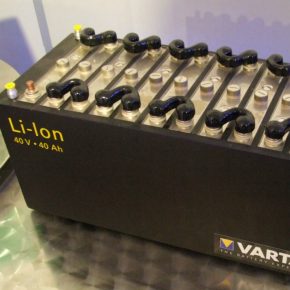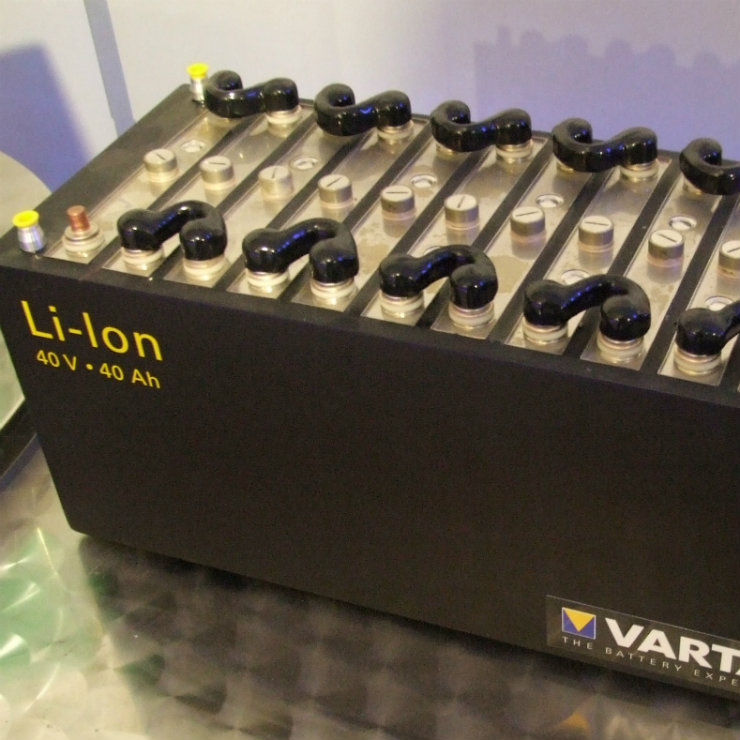Tydzień w gospodarce
Category: Raporty

(Claus Ableiter, CC BY-SA)
The sale of electric cars in the European Union is expected to increase from 120,000 up to 200,000 this year. However, this is still not enough for electromobility to become a new driver of the European economy, as EU officials and politicians from individual countries, including Poland, would like.
The popularization of electric and hybrid vehicles in the coming years will result in increased investments in automotive technologies. European manufacturers of electric and hybrid vehicles will increase their sales, both on the local markets and abroad. The development of the industry mainly depends on batteries, and today 50 per cent of the global battery production is located in China. As a result, the EU decided to fight for this market and founded a “battery alliance” in October 2017, which was joined by the managers of the largest companies in the automotive, engineering and chemical industries. In accordance with the plans of EU officials a consortium similar to the Airbus consortium has to be created. The latter was created over half a century ago in order to strengthen European cooperation in the field of aerospace technology. At the same time, it supported economic development and technological progress in Europe. The purpose of the “Airbus for batteries” is similar.
The think-tank Center for Social and Economic Research (CASE) points out in its report that starting from 2025 the battery market could reach the value of as much as EUR250bn annually. The demand for lithium-ion batteries in Europe is expected to reach 200 GWh (this is one-third of the predicted global demand), so the lack of local production may prove to be a problem for the competitiveness of the European automotive industry. It will make the domestic car manufacturers dependent on Chinese suppliers. That is why in February 2018, the European Commission (EC) called on the members of the consortium to act quickly in order to prevent the weakening of their competitive position.
The EC is working on a specific support plan, and according to Maroš Šefčovič, the Vice-President of the European Commission responsible for the Energy Union, the development of the EU battery market requires investing about EUR10-20bn in 10-20 large-scale battery factories. So far, the European Investment Bank has granted a loan of over EUR52m to one of the consortium members – the Swedish company Northvolt. The loan is part of the financial instrument known as InnovFin, Energy Demonstration Projects, which is supposed to enable the commercialization of new, innovative low carbon energy technologies. On April 2018, the company announced that it had launched the construction of a laboratory in Västerås near Stockholm, where it will start research and testing in 2019, preceding the mass production of lithium-ion batteries.
The production capacity of the factory that Northvolt (formerly SGF Energy AB) is planning to build is supposed to ultimately reach 32 GWh, which is similar to the production capacity of the Gigafactory, where Tesla plans to manufacture batteries with a total capacity of 35 GWh per year. Moreover, the creator and president of Northvolt is Peter Carlsson, Tesla’s former manager. The batteries in the Northvolt AB factory are to be manufactured mainly for the needs of the automotive and energy industries. The factory will reach full production capacity in 2024.
Last year, plans for the construction of battery factories in Europe were also announced by the Asian giants LG Chem and Samsung. LG Chem will receive PLN242.6m (EUR56.1m) from the Polish government for the construction of a factory in Kobierzyce near Wrocław. This is the highest grant that has been provided since 2007, awarded as part of a program supporting investments of key importance for the economy. The factory is to be the largest in Europe and will produce 100,000 batteries a year. Meanwhile, Samsung already opened its factory in Hungary in June 2017. There are plans to ultimately expand the production lines in that plant in order to enable the production of batteries for up to 50,000 electric cars per year. If we assume that the capacity of a battery set for an electric car is 50 kWh, that gives a production capacity in the order of 2.5 GWh.
In order to encourage European companies to build their own know-how, in March 2018, the EC announced a competition for innovative batteries for electric vehicles as a part of the EIC Horizon Prize. The prize pool of the contest entitled “Innovative battery for eVehicles” is EUR10m. The EIC Horizon Prizes are a part of the activities of the European Innovation Council (EIC) under the EU Framework Program for Research and Innovation Horizon 2020. The prize will be awarded for the development of a prototype battery that can power an electric vehicle whose performance characteristics in terms of range and charging time will be similar to those of a conventional gasoline or diesel family vehicle. The battery should also be relatively affordable, durable, safe and fully recyclable. It also has to be made from raw materials readily available in Europe and has to be as environmentally friendly as possible. Any dependence on imported or exotic materials such as rare-earth metals will reduce the project’s chances of winning.
This property is particularly important in the context of the recently published report of A.T. Kearney and Energy Transition Institute entitled “Battery Electric Vehicles”. The report points to the problems associated with emissions generated throughout the life cycle of the vehicle — from the extraction of raw materials needed for the production of the car, to the production of the vehicle and the batteries, the use of the vehicle, the charging, and the recycling. Above all, its authors point out that the batteries are produced on the basis of rare minerals such as nickel, cobalt and lithium. They indicate that battery manufacturers have huge problems with securing the supply of these key raw materials. Half of these raw materials come from the Democratic Republic of the Congo, where they are often mined by children and slaves in open-pit mines controlled by competing armed groups.
In December 2017, the EU adopted a law (which is to enter into force in 2021), which will limit the import of four raw materials from regions affected by armed conflicts (tin, gold, tantalum and tungsten). However, due to the lobbying efforts of the producers of electric cars, the regulations were mainly limited to smelters and refineries directly importing raw materials, and not to the car manufacturers themselves. The demand for rare minerals already far exceeds the supply. The “Battery Electric Vehicles” report indicates that above all there will be a shortage of cobalt, the prices of which are already rising by 150 per cent a year (the global resources allow for the production of 300 million cars, which will allow for the electrification of up to 25 per cent of the 1.2 billion cars currently driving on the roads). Similar problems are occurring in the case of lithium, whose production is not able to keep up with the 9 per cent increase in demand each year.
Therefore, the EU wants to base its competitive advantage on finished and, most importantly, cost-effective systems for the recycling and reuse of car batteries, for example, by treating them as energy stores. This part of the market cannot be compared with the production of electric cars and batteries (according to Bloomberg News Energy Finance, until 2024 solutions related to energy storage will not exceed 10 per cent of the market for lithium-ion batteries), but it is still very important for the manufacturers of electric vehicles due to the diversification and optimization of the production processes. That is why the EC has recognized the battery production sector as a key factor in the success of the Energy Union and the modernization of European industry.
This is why, according to analysts at the Center for Social and Economic Research (CASE), the words of Maroš Šefčovič, who announced that the EU must “charge its economy with the most effective, the most ecological and the cheapest batteries in the world, and most importantly, ones that are produced in Europe”, indicate that the EU’s significant support for businesses will go in this direction. This is all the more so since the Chinese are already getting a foothold in the EU. One of the three largest manufacturers of batteries for electric cars in the world, the Chinese company Contemporary Amperex Technology Ltd. (CATL), recently announced that it wants to build a factory in Europe in order to get ahead of Tesla. The plant built in Europe would supposedly supply major car manufacturers in the region, including BMW AG. They are considering locations in Germany, Hungary and Poland.



